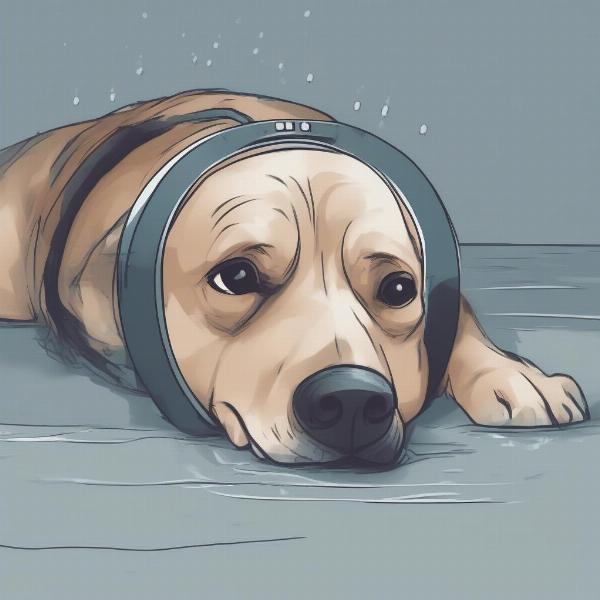A whimpering, crying dog after neutering is a common concern for many pet owners. While the procedure is generally safe and beneficial, it’s normal for your furry friend to experience some discomfort and behave differently in the days following surgery. This article provides practical advice and expert insights to help you understand why your dog might be crying after neutering, how to manage their pain, and when to seek veterinary attention.
Why is My Dog Crying After Being Neutered?
Several factors can contribute to your dog’s crying after neutering. Pain is the most obvious reason. While veterinarians administer pain medication during and after the procedure, its effectiveness can vary, and some dogs are more sensitive to pain than others. Disorientation and grogginess from the anesthesia can also contribute to whining and unusual behavior. Additionally, the unfamiliar feeling of the incision site and the Elizabethan collar (cone) can cause anxiety and distress.
 Dog Crying Due to Pain After Neutering
Dog Crying Due to Pain After Neutering
Managing Your Dog’s Post-Neuter Pain and Discomfort
Managing your dog’s post-neuter discomfort involves a combination of medication, environmental adjustments, and close monitoring. Follow your veterinarian’s instructions regarding pain medication diligently. Ensure your dog has a quiet, comfortable resting area away from other pets and children. The cone is essential to prevent licking and chewing at the incision site, which can lead to infection.
“A calm and predictable environment is crucial for a dog’s recovery after neutering,” says Dr. Emily Carter, DVM, a veterinary surgeon with over 15 years of experience. “Minimizing stress and providing a safe space can significantly reduce their anxiety and promote healing.”
When to Seek Veterinary Attention
While some crying and discomfort are expected, certain signs warrant immediate veterinary attention. Excessive crying, lethargy, loss of appetite, vomiting, diarrhea, or any discharge from the incision site should be reported to your veterinarian immediately. These could be signs of complications or infection.
Dr. Robert Miller, DVM, a certified veterinary behaviorist, adds, “It’s always better to err on the side of caution. If you’re concerned about your dog’s behavior or recovery, contact your veterinarian. Early intervention is key to preventing potential problems.”
Is it Normal for My Dog to Cry at Night After Neutering?
Yes, it is fairly common for dogs to cry more at night after neutering. The reduced activity and quieter environment can amplify their discomfort. Ensure they have a comfortable place to sleep and offer gentle reassurance if they are whimpering.
How Long Will My Dog Cry After Neutering?
Most dogs will show significant improvement within a few days of the surgery. The crying should gradually decrease as the pain subsides and they adjust to their post-operative state. However, some dogs may experience mild discomfort for up to a week or two.
Conclusion
A crying dog after neutering is a common occurrence and usually indicates discomfort related to the procedure. By following your veterinarian’s instructions, managing their pain, and providing a comfortable environment, you can help your furry friend recover quickly and comfortably. However, be vigilant for signs of complications and contact your veterinarian immediately if you have any concerns.
FAQ
- Why is my dog crying after being neutered? Pain, disorientation from anesthesia, and the unfamiliar feeling of the incision and cone are common reasons.
- What can I do to help my dog feel better? Follow your veterinarian’s instructions regarding pain medication, provide a quiet resting area, and prevent them from licking the incision site.
- When should I contact my veterinarian? Excessive crying, lethargy, loss of appetite, vomiting, diarrhea, or discharge from the incision site require immediate veterinary attention.
- Is it normal for my dog to cry more at night? Yes, reduced activity and a quieter environment can amplify their discomfort.
- How long will the crying last? Most dogs improve within a few days, but some may experience mild discomfort for up to a week or two.
ILM Dog is your trusted partner in providing comprehensive information and expert guidance on all aspects of dog care. From breed selection to health, training, and nutrition, we offer valuable resources to help you navigate the joys and challenges of dog ownership. We are committed to providing the highest quality of care for your canine companion. For more insights and personalized advice, contact us at [email protected] or call us at +44 20-3965-8624. Visit ILM Dog for a wealth of information to help you provide the best possible care for your furry friend.